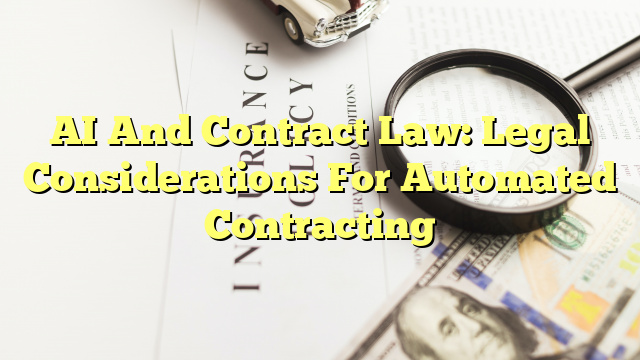Table of Contents
- Introduction
- Legal Implications of AI
- Can AI Review Legal Contracts?
- AI Accelerates the Legal Contract Drafting Process
- Disadvantage of AI in Contract Management
- Conclusion
Introduction
In the modern world, artificial intelligence (AI) and machine learning techniques have made a dramatic impact in many fields of endeavor, including law. AI is increasingly used in contract management, and this technology has the potential to provide significant benefits to organizations. However, there are also significant legal considerations that must be taken into account when utilizing AI in the contract creation and management process.
Legal Implications of AI
When utilizing AI in contract management, organizations must take into account the legal implications of this technology. AI-based systems can be used to automate the contract drafting and review process, as well as to provide insights into contract provisions. However, organizations must be aware of the potential legal risks associated with using AI in this process.
One of the primary legal considerations is the potential for AI-based systems to violate people’s privacy. AI-based systems can store and analyze vast amounts of data, and this data can contain sensitive personal information. Organizations must ensure that they have adequate safeguards in place to protect individuals’ privacy when utilizing AI-based systems.
Organizations must also consider the potential for AI-based systems to produce inaccurate or biased results. AI-based systems can be trained on data sets that contain biases or inaccuracies, and this can lead to AI-generated contracts that are not legally enforceable or that contain provisions that are not in the best interests of the organization.
Organizations must also ensure that they are compliant with applicable laws and regulations when utilizing AI-based systems. AI systems must be tested and monitored to ensure that they are in compliance with all applicable laws and regulations, and organizations must be aware of the potential penalties for non-compliance.
Can AI Review Legal Contracts?
AI-based systems can be used to review legal contracts. AI-based systems can be trained to analyze contracts and identify potential issues that may need to be addressed. This can be beneficial for organizations as it can help to reduce the time and cost associated with contract review.
AI-based systems can also be used to identify areas of potential risk in contracts. AI-based systems can be trained on data sets of contracts that have been successfully enforced in court, and this can allow the AI to identify potential areas of risk in contracts. This can help organizations to reduce their exposure to legal risks.
AI Accelerates the Legal Contract Drafting Process
AI-based systems can be used to accelerate the legal contract drafting process. AI-based systems can be trained to generate contracts based on a set of parameters that has been specified by the organization. This can reduce the amount of time and cost associated with the contract drafting process, as well as reducing the potential for errors.
AI-based systems can also be used to review contracts and identify areas that may need to be modified. AI-based systems can be trained to analyze contracts and suggest areas that may need to be modified to ensure that the contract meets the organization’s legal and business objectives.
Disadvantage of AI in Contract Management
One of the primary disadvantages of using AI-based systems in contract management is the potential for errors. AI-based systems can make mistakes and produce contracts that are not legally enforceable or that contain provisions that are not in the best interests of the organization. Organizations must ensure that they have adequate safeguards in place to ensure that AI-based systems do not produce contracts that are not legally enforceable or that contain provisions that are not in the best interests of the organization.
Organizations must also consider the potential for AI-based systems to

